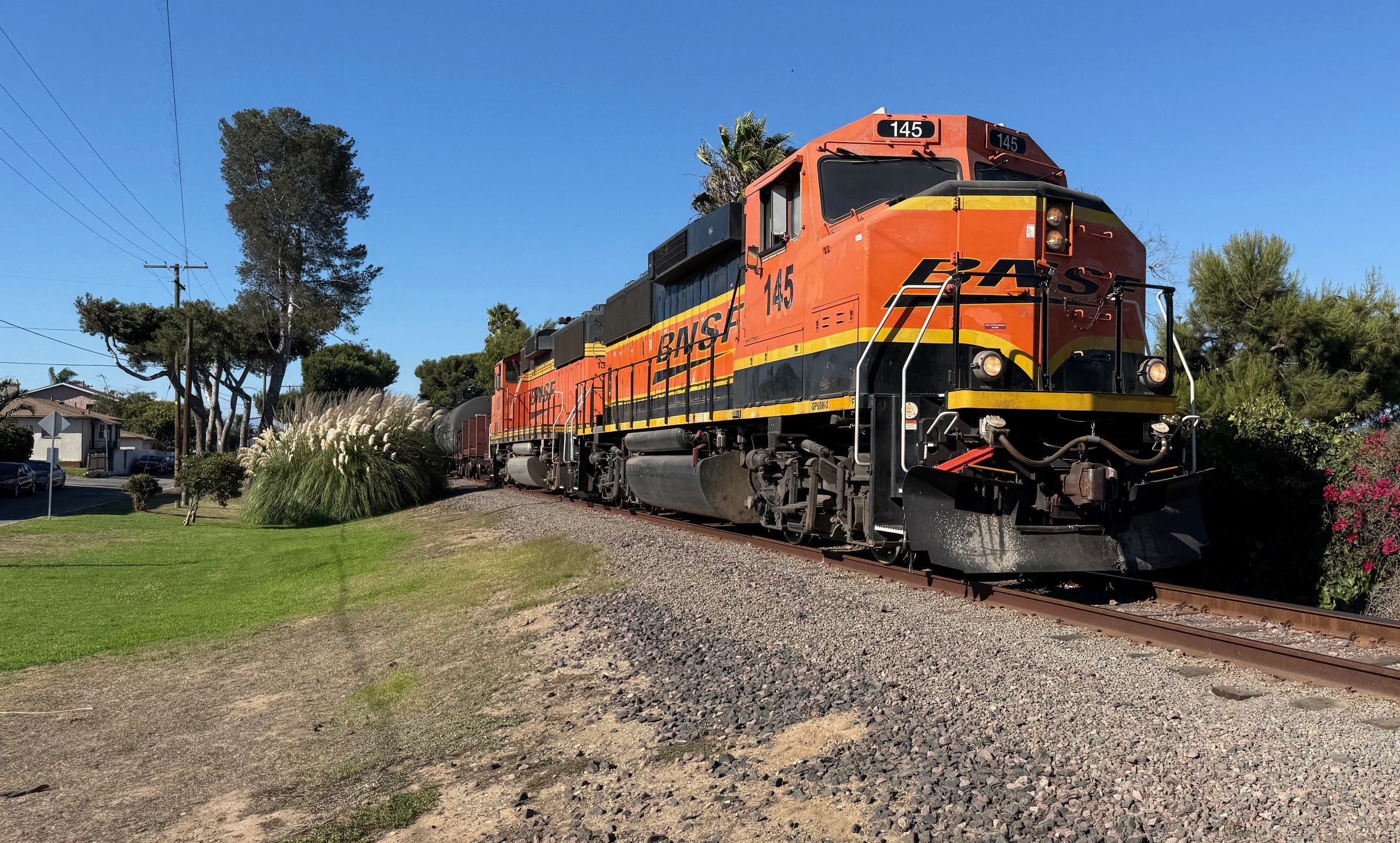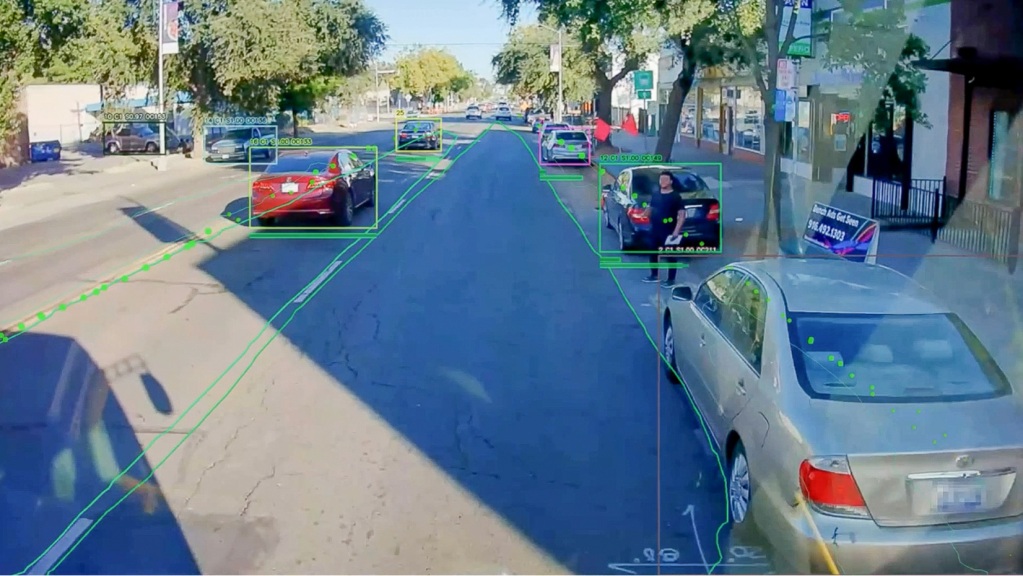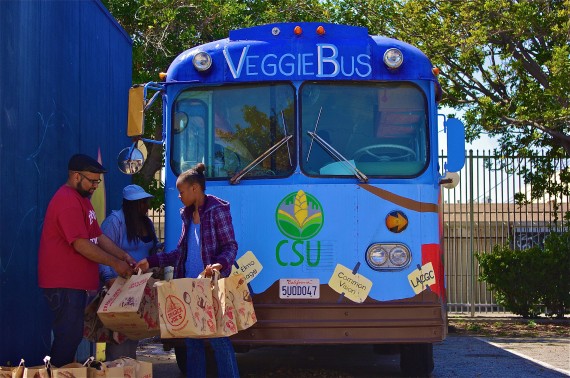
"LOOK AT THE STRAWBERRIES!!" squealed a student, pointing at the luscious red berries peeking out from under the leaves.
"Can we eat them?" asked Cesar hungrily.
Cesar and the other students working in Community Service Unlimited's (CSU) Expo Garden that morning decided to spend their spring break volunteering in area gardens and learning about social justice issues through food. Some thought it would be a fun way to finish up the 50 hours of community service students are required to perform to graduate from a LAUSD high school. Others had already completed their hours or, like Cesar, were there because they just really liked gardening.
When asked what he liked so much about it, he confessed that he hadn't known that gardening was about more than just planting a seed.
"It's pretty complicated," he said, enthusiastically rattling off a list of all of the factors that could potentially impact the growth of a crop as well as the amount of maintenance some of them needed in order to thrive.
Julia, a student who is very passionate about gardening, said she thought it was important to step away from all of the technology and material things that distract us and "look at our health and the environment as [also being] part of the American dream."
"People don't appreciate the value of manual labor," she said, waggling her rake. The garden gave her the opportunity to build an appreciation of nature and the costs involved in food production, which included "the resources that had [to be] destroyed" to feed our consumption habits.
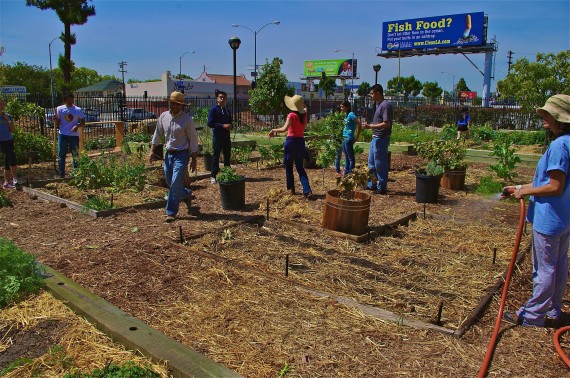
The teachers had brought the students to CSU's garden because they wanted the students to learn about more than just how to nurture seeds. They were part of a larger peace and justice program that used food and access to food as a way to teach about social justice, something that fit perfectly with CSU's own mission of "serving the people, body and soul."
CSU is descended from the Black Panthers, Executive Director Neelam Sharma told me. Though that may seem surprising, food issues had long been a significant part of the Panthers' approach to community building. In addition to their political advocacy work, they had offered a number of services including breakfast programs, health screenings, nutrition classes, and even a food cooperative.
Although they had inherited the Panther's desire to reduce violence within Black and Brown communities, "rather than trying to meet the immediate needs of the community [as the Panthers did]," said Sharma, "we're more focused on building enterprises and building the skills, talents, and knowledge in the community that enables and empowers people to meet their own needs...It's a longer-term approach."
Food was a natural entry point for this kind of work because its production and people's access to it comes up against a number of issues, said Sharma, including land use, planning, politics, culture, health, and equity. As such, it opens the door for CSU staff to educate communities on how these issues overlap and to cultivate the kind of critical thinking among participants that will help them build better solutions for their own neighborhoods.
To this end, CSU runs a number of programs under the umbrella of what they call a "Community Food Village," including Growing Healthy (engaging urban youth in the classroom), From the Ground UP! (engaging at-risk youth in internships and apprenticeships), and a Village Marketplace (selling produce at stands and through corner markets).
Interns assist with both the Market and Growing Healthy programs, learning farming, gardening, entrepreneurial skills, and community organizing. They are also essential to CSU's community outreach efforts, as I saw this past weekend, when I spent 6 long (but fun!) hours walking the streets with staff and interns, knocking on doors and informing residents about Earth Day South L.A., an event promoting CSU's vision for a more vibrant and earth-friendly South Los Angeles.
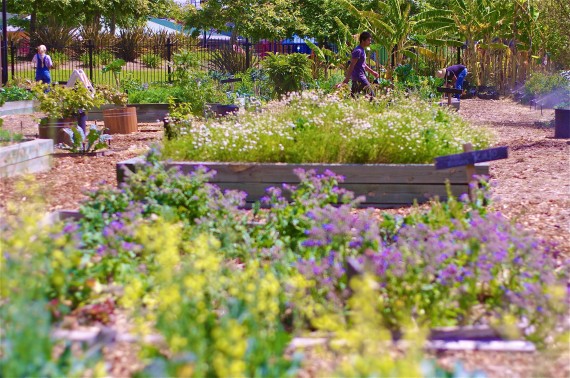
In the past, said Sharma, conquerors would work to subjugate populations by alienating them from the land, just as they tried to change their language, culture, and religion. For this reason, a core element of CSU's approach involves teaching residents from South L.A. about the cultural heritage of their own ancestors as it relates to food and agriculture. The goal is to link them more deeply to each other by reconnecting them to the earth that lies somewhere underneath all of L.A.'s asphalt.
The issues facing South L.A. are complex and deeply systemic. To effectively tackle such problems, solutions must therefore also be system-oriented, said Sharma of their multi-faceted approach. But that doesn't mean you can't start simple. At the most basic level, says Sharma, it makes sense to engage communities through food.
"We can't educate kids that aren't nourished."
The Earth Day South L.A. event takes place April 14, from 11 am - 4 pm at the Normandie Avenue School in South Los Angeles. Please join them in participating in service projects, activities for kids, cooking demos, gardening workshops, recycled art workshops, yoga, West African dancing, drumming, music, and live mural painting. For more information please visit their website.




